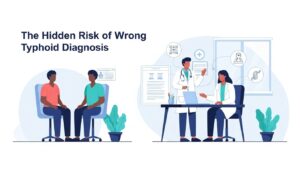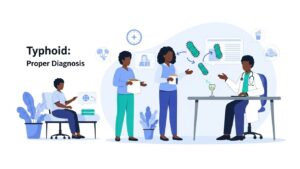Breast cancer is a major public health concern worldwide, affecting millions of women every year. Early detection and proper treatment can significantly improve survival rates, making it essential to raise awareness about the condition. This article explores the key aspects of breast cancer, including statistics, risk factors, symptoms, treatment options, and preventive measures.
Overview of Breast Cancer
Breast cancer occurs when cells in the breast grow uncontrollably, forming a tumor that can spread to other parts of the body. While it primarily affects women, men can also develop breast cancer, although rare.
Globally, breast cancer has become the most common cancer, surpassing other forms of cancer with 2.26 million cases recorded in 2020. In both developed and developing countries, breast cancer continues to be a leading cause of cancer-related deaths among women.
Breast Cancer Statistics in Nigeria
- 23% of all cancer cases in Nigeria are breast cancer, making it the most common form of cancer among women.
- It accounts for 18% of cancer-related deaths in the country.
- Cases are on the rise in Nigeria due to urbanization and lifestyle changes.
- Breast cancer survival rates are low: 80% of patients survive one year after diagnosis, but this drops to 32% at five years, especially for late-stage diagnoses.
- Multimodality treatment (combining chemotherapy, surgery, and radiotherapy) shows better survival rates than single treatments.
Who is at Risk of Breast Cancer?
Anyone with breast tissue is at risk, but some groups are more vulnerable than others.
Key Risk Factors for Breast Cancer
- Age: Women over 50 are more likely to develop breast cancer.
- Family History: A family history of breast cancer increases the likelihood of developing the disease.
- Genetic Mutations: BRCA1 and BRCA2 gene mutations are linked to a higher risk.
- Hormonal Factors: Prolonged exposure to estrogen through hormone therapy, oral contraceptives, or late menopause increases the risk.
- Lifestyle Factors: Lack of physical activity, obesity, alcohol consumption, and unhealthy diets are contributing factors.
- Urbanization: Changes in lifestyle due to urban living, including stress and diet, are influencing rising cases in Nigeria.
Common Symptoms of Breast Cancer
- A lump or thickened tissue in the breast or underarm area
- Changes in the size, shape, or appearance of the breast
- Dimpling or puckering of the skin
- Nipple discharge (other than breast milk), sometimes with blood
- Inverted nipple or nipple pain
- Redness, scaling, or swelling on the breast or nipple
Early signs may not always be noticeable, which is why routine screenings like mammograms are essential.
Treatment Options for Breast Cancer
Treatment for breast cancer varies depending on the stage and type of cancer. In Nigeria, these are the most common treatment modalities:
- Chemotherapy: Administered to shrink tumors or kill cancer cells.
- Surgery: Includes lumpectomy (removing the tumor) or mastectomy (removing the entire breast).
- Radiotherapy: Often used alongside surgery to kill remaining cancer cells.
- Hormone Therapy: Recommended if the cancer is hormone-receptor positive.
- Targeted Therapy: Involves drugs designed to target specific cancer cells with fewer side effects.
Combination or multimodality treatment—using chemotherapy, surgery, and radiotherapy—leads to better survival outcomes than using a single approach.
Prevention and Early Detection
Although breast cancer cannot always be prevented, certain lifestyle changes can reduce the risk:
- Maintain a healthy weight through regular exercise.
- Limit alcohol consumption and avoid smoking.
- Eat a balanced diet rich in fruits, vegetables, and whole grains.
- Practice breast self-examinations (BSE): Regularly checking your breasts can help you detect abnormalities early.
- Get regular screenings: Mammograms and clinical breast exams are essential, especially for women over 40.
Importance of Early Detection
Early detection is crucial for improving breast cancer survival rates. Studies show that women diagnosed in the early stages (Stage I or II) have significantly better outcomes than those diagnosed in later stages (Stage III or IV).
In Nigeria, the late presentation of breast cancer remains a major challenge, often due to lack of awareness, fear, cultural beliefs, and stigma. Nearly 50% of patients do not complete their prescribed chemotherapy treatments due to various barriers, including limited access to healthcare facilities.
Why Seek Medical Help Early?
Delaying medical consultation or treatment can worsen outcomes. Here’s why seeking help early is essential:
- Better Treatment Options: Early-stage cancer offers more treatment options and higher success rates.
- Improved Survival Rates: Early detection can increase the 5-year survival rate from 32% to over 90%.
- Less Invasive Treatments: Early detection may reduce the need for aggressive treatments like mastectomy
Conclusion
Breast cancer awareness, early detection, and timely treatment are crucial in reducing mortality rates. Regular screenings, lifestyle modifications, and educational interventions are essential tools in the fight against breast cancer in Nigeria and beyond.
If you notice any unusual changes in your breasts, don’t wait to seek medical advice. Early detection saves lives.
At Well-Life Hospital, we offer breast cancer screening services, treatment options, and patient support. Take the first step—schedule your screening today and protect your health.
Frequently Asked Questions (FAQs)
- How often should I do a breast self-exam?
Monthly breast self-exams are recommended, especially for women over 20 years old. - What is the recommended age for mammograms?
Women aged 40 and above should get annual or biennial mammograms, depending on their risk factors. - Can men get breast cancer?
Yes, although rare, men can develop breast cancer and should be aware of symptoms like lumps or nipple discharge. - Is breast cancer curable?
If detected early, breast cancer is highly treatable, and many patients can live cancer-free after treatment.
Contact Well-Life Hospital
At Well-Life Hospital, a renowned infertility treatment center located at No. 12 Atbara Street, Wuse 2, Abuja, FCT, we are dedicated to providing compassionate and comprehensive care to help you on your journey to parenthood. To learn more about our IVF services and to book a consultation, visit our website or contact us today.
- Website: welllifehospital.com
- Instagram: @welllifehospital
- Facebook: Well Life Hospital
- Twitter: @Well_Life_H
- TikTok: @welllifehospital
- YouTube: Well Life Hospital
- Mobile : +234 906 000 4314
… Your wellbeing is our goal






